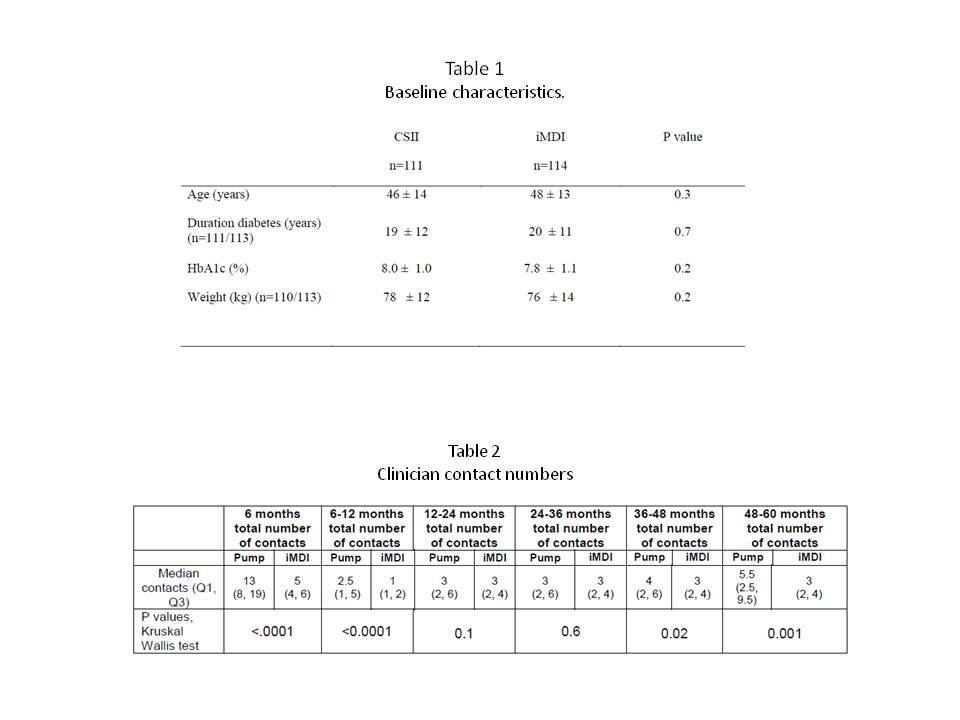Oral Presentation Australian Diabetes Society and the Australian Diabetes Educators Association Annual Scientific Meeting 2014
An analysis of clinician contacts in the long term management of insulin pumps compared with an intensive insulin adjustment programme (#190)
 We have previously shown that the benefits of insulin pump initiation (CSII) and an intensive insulin adjustment programme (iMDI) in the management of adults with type 1 diabetes are significant initially but decrease over time1. It is not known how much clinician time is required to manage CSII and iMDI patients over a prolonged period, and whether the number of clinician contacts has an impact on HbA1c changes over time. The aim of this study was to determine and compare clinician contacts in patients on multiple daily insulin injections commencing CSII or iMDI, and the correlation with HbA1c change over time. This was a retrospective analysis of patients attending the BakerIDI diabetes clinics between 2000 and 2011, who commenced either CSII or an iMDI programme. Clinician (physician, educator or dietitian) contact was face to face or phone/email contact, and all contact visits with the diabetes team were included up to 60 months post CSII or iMDI commencement.
We have previously shown that the benefits of insulin pump initiation (CSII) and an intensive insulin adjustment programme (iMDI) in the management of adults with type 1 diabetes are significant initially but decrease over time1. It is not known how much clinician time is required to manage CSII and iMDI patients over a prolonged period, and whether the number of clinician contacts has an impact on HbA1c changes over time. The aim of this study was to determine and compare clinician contacts in patients on multiple daily insulin injections commencing CSII or iMDI, and the correlation with HbA1c change over time. This was a retrospective analysis of patients attending the BakerIDI diabetes clinics between 2000 and 2011, who commenced either CSII or an iMDI programme. Clinician (physician, educator or dietitian) contact was face to face or phone/email contact, and all contact visits with the diabetes team were included up to 60 months post CSII or iMDI commencement.
Results: Baseline data is shown in table 1. The total number of contacts over the 60 month period was significantly increased in CSII 35.5 (27.5, 47) compared with iMDI 21 (18, 27), p < 0.001. Contact visits decreased over time (table 2.). There was significant correlation between total contacts and HbA1c change at 6 months, r = -0.27, p = 0.008; allied health face to face r = -0.21, p = 0.04; and allied health email/phone r = -0.24, p = 0.02 in CSII but not for iMDI, or physician visits in either group.
Conclusion: CSII was associated with greater staff requirements in the long term compared with iMDI. Contacts declined over time with both CSII and iMDI patients, and may explain the loss of HbA1c benefit over time. HbA1c correlation with HbA1c change reinforces the importance of allied health contact in CSII.
- 1. Cohen N. D. Hong E. S. Van Drie C. Balkau B. & Shaw J. Long-Term Metabolic Effects of Continuous Subcutaneous Insulin Infusion Therapy in Type 1 Diabetes; Diabetes Technology & Therapeutics. July 2013, 15(7): 544-549